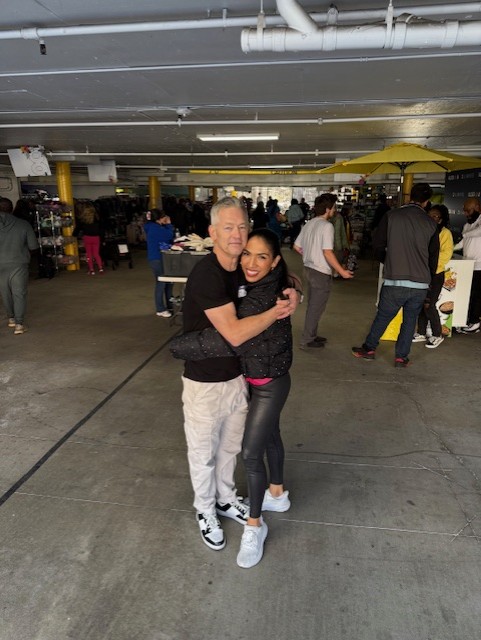
As the wildfires raged across Los Angeles last month, Gina Zapanta ’07, her husband Mike Alder, and their two youngest children were safe in the hills of Sherman Oaks. But with their power out and the winds gusting, they decided to evacuate to a nearby hotel for the night.
“The next morning we're checking out, and the phone [at the hotel] is ringing off the hook,” said Zapanta, who is a member of the LMU Loyola Law School Board of Directors. They realized it was people like them, trying to get a room to escape the wildfires. Instantly, Zapanta and Alder had an idea.
“Mike said, ‘Let’s just get as many rooms as they have.’ There were 10 left. So we booked all of them,” Zapanta said.
Zapanta quickly posted a video to her social media pages offering the rooms for free to anyone needing a place to go. Within a few hours the video went viral; while many reached out to request a room, others wanted to find out how they could help the effort.
It was not surprising to Zapanta so see that level of enthusiasm. She has come to expect it from many in her orbit – and particularly from those at LLS.
“There’s something about the narrative and the culture at Loyola Law School that communicates, I think, to the students the expectation that we are the answer to social justice questions,” she said.
Over the next three weeks, Zapanta and Alder used the existing infrastructure in the community outreach department at their firms, Alder Law and Z.A. Lawyers, to organize the project and provide more than 300 hotel rooms to about 500 parents, children and pets. They ultimately raised over $100,000 to make it possible.
“It started as a private effort,” Zapanta said. “It was fully, completely privately funded. And only because the community started sending me these funds was I able to get more rooms and extend stays.”
A week after the fires started, Zapanta and Alder realized that evacuees’ needs were changing. Many had found housing, but they still needed items to replace what they had lost. So, they organized a “marketplace” in the parking garage of their firm full of donated clothes, household items and more, complete with a DJ and food vendors. More than 800 people came over two days to shop completely free.
Now, their efforts have shifted again, from collecting and distributing physical donations to gift cards. They have given $32,500-plus in American Express gift cards to 37 families with minor children who have lost their homes. Each family receives $1,000 or $500 depending on the number of children. Future efforts will focus on providing mental health services to people dealing with the trauma of losing their homes.
Zapanta has heard from dozens of people who have received help through her efforts who share stories of how their lives have been impacted by the wildfires and how much the hotel room, donated items or gift card has helped them.
“One woman said, ‘I came to your free marketplace. I can't tell you the glimmer of hope you gave me. I didn't know what to do, but you guys sent me home with a backpack of items that I didn't even know I needed at the time,’” Zapanta said. “The compounded problems people have, it's a lot. It's heartbreaking.”
Zapanta and Alder view their community work as part of their job as lawyers. Their work is not just about signing new clients, it’s about helping the whole community.
“It's such a privilege to do this. It's our responsibility,” she said. “This is part of us being lawyers; it’s not just about getting a client in and legally advocating for them. It's more about being a steward in the community and someone people can truly trust. This is part of advocating for the voiceless in our opinion.”
Their advocacy has not stopped at wildfire relief, however. Zapanta and Alder are also launching the Equity and Justice Alliance to help people get connected to lawyers in response to new immigration policies. They are working to recruit lawyers with immigration experience who can offer pro bono work – or a discounted price – to be listed in a directory that will be distributed to anyone who reaches out in need of legal advice.
Like the wildfire relief effort, there will also be a fundraising component to the project. Any donations received will help offset legal costs if a lawyer wants to help but can’t do pro bono work.
“It has nothing to do with politics. This is about humanity,” Zapanta said. “This is about protecting the law and protecting people's constitutional rights regardless of their documentation.”
Zapanta encourages anyone who wants to help, including students, to reach out to immigration firms or nonprofits. Volunteers need not be licensed attorneys; they just need to be able to educate people about their constitutional rights or help translate.
Follow @zalawyers or @ginazapanta_ on Instagram for updates on all of Zapanta’s and Alder’s community work and ways to get involved.